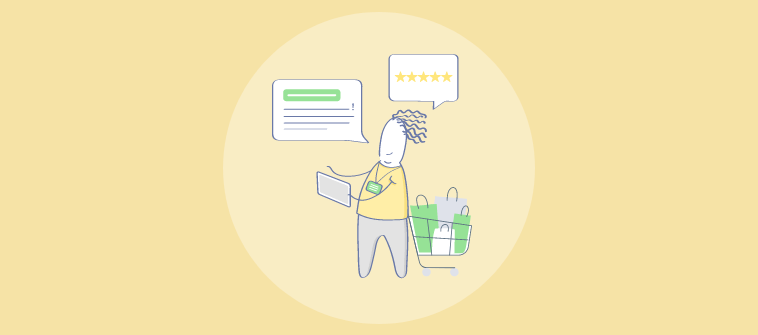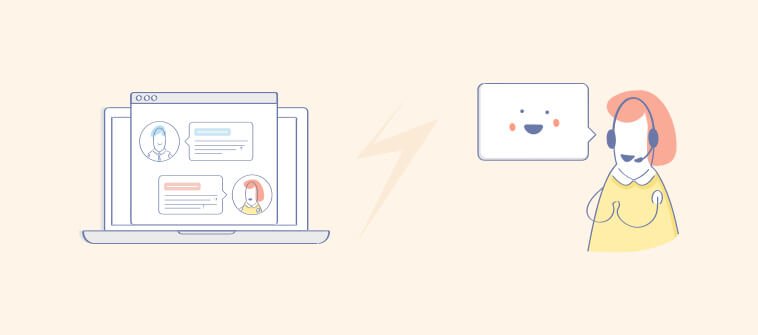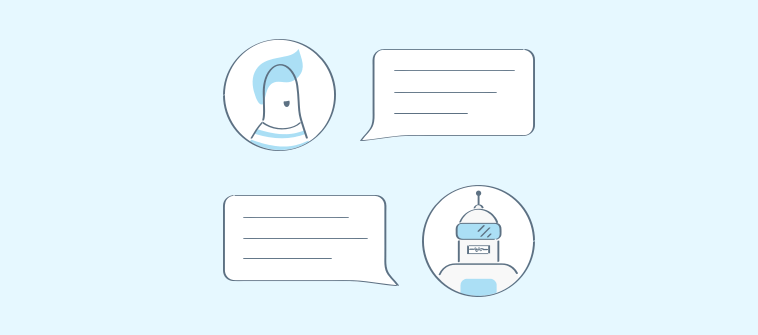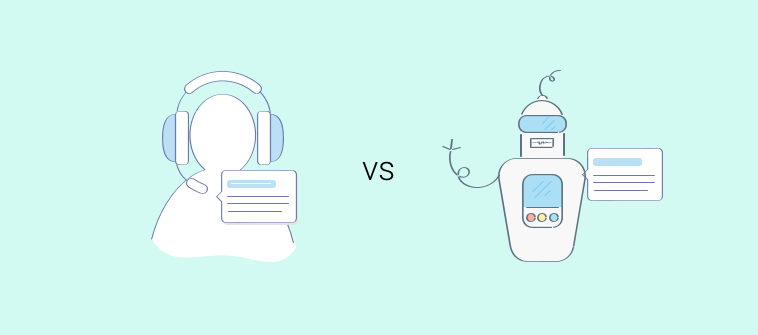Remember the last time you needed quick help but got lost in an endless FAQ section? Frustrating, right?
Now, imagine a digital helper always ready to assist—this brings us to the topic of Chatbots vs. Virtual Assistants. While both tools improve user interactions, understanding the key differences between chatbots and virtual assistants is crucial.
Chatbots are designed for quick, task-oriented responses, while virtual assistants provide more advanced, personalized, and ongoing support.
In this blog, we’ll compare their features, use cases, and benefits, helping you understand which is the right fit for your needs. So, stay tuned!
What are Chatbots?
Chatbots are AI-powered tools that simulate human conversation through text or voice interactions. They are used in websites, messaging apps, and online help centers to assist users by answering questions, providing recommendations, and automating tasks.
Chatbots come in two main types: rule-based and AI-driven. Rule-based bots follow preset rules and respond to specific commands. In contrast, AI-driven bots, powered by natural language processing (NLP), can understand and learn from conversations, offering more dynamic and personalized interactions.
Some famous chatbot examples include Domino’s Dom, Nike’s StyleBot, and Bank of America’s Erica. Chatbots are widely used for customer support, lead generation, sales, appointment booking, and more. They improve the user experience by providing instant responses.
What are AI Virtual Assistants?
AI virtual assistants are intelligent software programs that assist users by automating tasks, providing information, and boosting productivity. These assistants use artificial intelligence (AI) and natural language processing (NLP) to understand and respond to user queries, often through text or voice.
Virtual assistants can handle various tasks, from scheduling appointments, answering questions, controlling smart home devices, and managing emails.
Some famous examples include Apple’s Siri, Amazon’s Alexa, and Google Assistant, which can perform various functions across different devices. AI virtual assistants constantly learn and improve through machine learning, adapting to user preferences over time. They can work seamlessly across multiple platforms, offering personalized experiences and saving users time.
These virtual assistants are becoming integral in personal and professional settings, driving efficiency and convenience.
What are the Key Differences Between Chatbots and AI Virtual Assistants?
While the terms “chatbots” and “AI virtual assistants” are often used interchangeably, understanding the differences between chatbots and virtual assistants is crucial. Here’s a breakdown of their core differences:
Chatbots:
- Focus: Primarily designed for simple, automated conversations, often following pre-defined rules or decision trees.
- Capabilities: Excel at handling frequently asked questions, providing basic information, and completing routine tasks (like scheduling appointments or placing orders).
- Personalization: Limited personalization, typically relying on keyword recognition and basic user inputs.
- Learning: May have some basic learning capabilities but primarily rely on pre-programmed responses.
- Examples: Basic customer service bots on websites and automated messaging systems.
AI Virtual Assistants:
- Focus: Aim to simulate human-like conversations and provide comprehensive assistance across a wider range of tasks.
- Capabilities: Leverage advanced AI techniques (like natural language processing and machine learning) to understand complex requests, learn user preferences, and provide personalized responses.
- Personalization: Offer a high degree of personalization, adapting to individual user needs and preferences over time.
- Learning: Continuously learn and improve through user interactions and data analysis.
- Examples: Siri, Google Assistant, Alexa.
Here is a small comparison table for better understanding:
| Feature | Chatbots | Virtual Assistants |
|---|---|---|
| Core Purpose | Automated conversations, simple tasks | Simulate human-like interaction, comprehensive assistance |
| AI Capabilities | Basic, rule-based | Advanced, NLP-powered |
| Personalization | Limited | High |
| Learning | Basic | Continuous |
| Interaction | Primarily text-based | Text, voice, and potentially visual |
| Examples | Eva by HDFC Bank, Dom by Domino’s | Siri, Google Assistant |
Use Cases Comparison of Chatbots & AI Virtual Assistants
The use cases for both chatbots and virtual assistants are distinct based on their functionality and the complexity of tasks they can handle. Here’s a comparison of how each is typically used:
Chatbot Use Cases:
- Customer Support: Chatbots are commonly used to answer FAQs, resolve common issues, and guide users through processes like order tracking or appointment booking.
- Lead Generation: They can qualify leads by collecting information and directing users to the right sales representatives.
- E-commerce Assistance: Chatbots help with product recommendations, processing returns, and providing basic support for online shoppers.
- Survey and Feedback Collection: Businesses use chatbots to collect customer feedback in an automated and efficient manner.
Virtual Assistant Use Cases:
- Personal Task Management: AI assistants like Siri or Google Assistant manage calendars, set reminders, send messages, and make calls based on voice commands.
- Data Analysis and Insights: They help businesses by analyzing data, generating reports, and providing actionable insights.
- Scheduling and Bookings: AI virtual assistants can automatically schedule meetings, manage complex appointments, and handle travel bookings.
- Smart Home Control: They can manage smart home devices, adjust settings, and integrate with home automation systems for personalized control.
While chatbots excel in straightforward, transactional tasks, AI virtual assistants are better suited for complex, personalized interactions that require learning and adaptation.
FREE. All Features. FOREVER!
Try our Forever FREE account with all premium features!
What are the Advantages of Chatbots & AI Virtual Assistants?
Both chatbots and AI virtual assistants offer a range of advantages, making them valuable tools for businesses and individuals alike. Here’s a breakdown of their key benefits:
Advantages of Chatbots:
- 24/7 Availability: Chatbots are always available to assist users, providing consistent support even outside business hours.
- Fast Training: Chatbots can be trained using your existing knowledge base and website content to provide accurate answers and improve their efficiency over time.
- Cost-Effective: They reduce the need for human agents, lowering operational costs by handling repetitive tasks and queries.
- Quick Response Time: Chatbots can provide instant answers to common questions, improving user experience and satisfaction.
- Simple Integration: Chatbots are easy to integrate into websites, apps, and social media platforms, enabling businesses to provide quick support across multiple channels.
Advantages of AI Virtual Assistants:
- Personalization: AI virtual assistants use machine learning and natural language processing to understand user preferences and provide tailored recommendations.
- Multitasking: They can manage multiple tasks at once, such as scheduling, sending emails, and making calls, all through a conversational interface.
- Advanced Problem Solving: Virtual assistants handle complex queries, provide context-aware responses, and even learn from past interactions to improve over time.
- Voice Interaction: Many AI assistants are voice-enabled, allowing users to interact hands-free, especially in smart homes or while driving.
- Integration with Smart Devices: AI virtual assistants can connect with IoT devices, offering seamless control of smart home systems, appliances, and more.
Both chatbots and AI virtual assistants offer unique benefits, with chatbots excelling in efficiency and cost-effectiveness for basic tasks and AI assistants providing advanced, personalized support for complex, multi-functional needs.
Chatbots vs. AI Virtual Assistants: Which is Better for your Business?
Choosing between a chatbot and an AI virtual assistant isn’t about picking one as “better” – it’s about finding the right fit for your specific business needs. Both offer unique strengths, and the best choice depends on your goals and resources.
Consider a chatbot if:
- You need to automate simple, repetitive tasks like answering FAQs or collecting information.
- Your budget is a primary concern, as chatbots are generally more affordable to implement.
- You want to provide instant support and improve response times, especially outside of business hours.
Consider an AI virtual assistant if:
- You want to offer a more personalized and engaging customer experience.
- You need assistance with complex tasks, such as scheduling, research, or data analysis.
- You’re looking for a solution to learn and adapt to your business needs over time.
Sometimes, a combination of both is the perfect solution.
You could use a chatbot to handle initial inquiries and simple requests, then seamlessly escalate more complex issues to an AI virtual assistant or human agent. Ultimately, the best approach is to carefully evaluate your requirements, consider your budget, and explore the capabilities of different solutions.
What are the Future Trends in AI-Powered Tools?
The future of AI-powered tools is exhilarating, with advancements poised to transform industries across the globe. Here are some key trends to watch:
- Increased Automation: AI will continue streamlining processes, enabling fully automated workflows for tasks like customer service, data analysis, and content generation. This will enhance efficiency and reduce operational costs.
- AI and Natural Language Processing (NLP): Advances in NLP will allow tools to understand and generate human language more effectively, leading to improved chatbots, virtual assistants, and language translation tools.
- Personalization at Scale: AI will drive hyper-personalization in marketing, customer support, and sales, using data to tailor experiences, recommendations, and solutions to individual users in real time.
- AI in Healthcare: From diagnosing diseases to personalized treatment plans, AI tools in healthcare will become more integrated, improving patient care and streamlining medical practices.
- AI Ethics and Privacy: As AI adoption grows, there will be an increasing focus on ethical concerns and privacy regulations to ensure the responsible use of AI, especially regarding data security and bias mitigation.
- AI in Creativity: Tools that aid in creative processes, such as content generation, art creation, and music composition, will evolve, helping artists and marketers achieve new heights of creativity.
- Edge AI: Through edge computing, AI models will move closer to the data source, reducing latency and improving performance, especially in real-time applications like autonomous vehicles and IoT devices.
These trends point to a future where AI-powered tools are deeply embedded in every facet of life, making tasks more efficient, personalized, and intelligent.
Chatbots or Virtual Assistants? Find the Perfect Fit for Your Business Needs!
When it comes to virtual assistant vs. chatbot for businesses, understanding the differences can help businesses choose the right tool to improve customer engagement.
To make the most of either tool, start by analyzing your customer service needs—chatbots are great for quick queries, while virtual assistants shine in providing personalized, ongoing support.
For businesses seeking a robust, AI-powered chatbot solution, ProProfs Chat provides an ideal platform. With features like customizable chatbots, real-time visitor tracking, and delightful reports and analytics, ProProfs Chat helps businesses improve customer satisfaction, streamline operations, and drive efficiency—all in one powerful tool.
Learn More About Chatbots and Virtual Assistants: FAQs
Which businesses benefit most from chatbots?
Businesses with high customer interaction volumes, like e-commerce, hospitality, banking, and tech support, benefit most. Chatbots streamline repetitive queries, reduce wait times, and enhance user experience.
Are virtual assistants more intelligent than chatbots?
Virtual assistants are typically designed to handle more complex, multi-step tasks and provide personalized interactions, making them well-suited for advanced use cases. AI chatbots, on the other hand, excel at quickly addressing specific queries and automating routine tasks. Both tools bring unique strengths, depending on the needs of the business or user.
How do chatbots and virtual assistants use AI?
Both tools use AI to understand and respond to user input. Chatbots often use predefined rules and basic natural language processing, while virtual assistants rely on machine learning, NLP, and data analytics for deeper conversational abilities and personalization.
FREE. All Features. FOREVER!
Try our Forever FREE account with all premium features!

 We'd love your feedback!
We'd love your feedback!
 Thanks for your feedback!
Thanks for your feedback!







